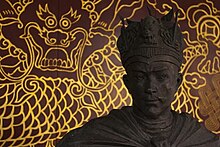User:Tinalei2014/sandbox/sandbox4
This article may be a rough translation from Chinese. It may have been generated, in whole or in part, by a computer or by a translator without dual proficiency. |
Li Xiucheng | |
|---|---|
 Li Xiucheng | |
| Nickname(s) | Philanthropist |
| Born | December 1823 invalid month Teng (藤縣), Guangxi, Qing Empire |
| Died | 7 August 1864 (aged 41) Jiangning, Nanjing, Qing Empire |
| Allegiance | Qing Empire (to 1849) Taiping Heavenly Kingdom (to 1864) |
| Years of service | 1852–1864 |
| Rank | Field Marshal |
| Battles / wars | Eastern campaign
Western campaign
|
| Awards | Loyal King |
Li Xiucheng (Chinese: 李秀成; pinyin: Lǐ Xiùchéng; 1823 – August 7, 1864) was a military commander during the Taiping Rebellion. He was born to a poor peasant family, but became known as the Loyal King (忠王) by the end of his life. This title was given because he refused the bribe of a Qing general officer to kill Hong Xiuquan, the founder and leader of the rebellion. As a general, he led Taiping forces to several victories. After his capture and interrogation at the third and final Battle of Nanjing in 1864, he was executed by Zeng Guofan. Li was the most important military leader of the rebel forces by the end of the Taiping Rebellion.
Notable victories against the Qing military forces
[edit]Second rout of the Jiangnan Army Group
[edit]Jiangnan Army Group (江南大營) was an important Qing army barracks in Nanjing. Li Xiucheng-led forces besieged it in an attempt to starve it out. Same in the second encirclement, the Qing army commanded 200,000 soldiers to fight with Taiping forces from March 1858, but they were routed by Li Xiucheng in May 1860. After that, Li went on to occupy all of Jiangsu provinces except Shanghai.
Two attacks on Shanghai
[edit]- Battle of Shanghai (1861) (the second time)
Escaped from Suzhou
[edit]Li Xiucheng's palace in Suzhou is the only one from the Taiping Rebellion that exists today. In July 1863, Li ordered his daughter's husband, Tan SauGuan, to take over control of Suzhou. But Li Hongzhang led the Why Army combined by the "Ever Victorious Army," which have been raised by an American, Frederick Townsend Ward, was placed under the command of Charles George Gordon. With this support, Li Hongzhang gained numerous victories leading to the surrender of Suzhou.
Determining battle: lead defend capital Nanjing
[edit]Chiang Donkey
[edit]The Chiang Donkey (蔣驢子) was Li Xiucheng's stable manager. Before the fall of Nanjing after three months in 1864, Li Xiucheng took his wealth, including many treasure, to Chiang Donkey and asked Chiang to take it out of Nanjing quickly and wait for Li Xiucheng somewhere. Chiang promised and took the treasure out by 20 horses and cows car, but Li was executed at last. Thus, Chiang Donkey became rich in Nanjing after the civil war.
Writing
[edit]"Autobiography of Zhong Prince Li Xiucheng (《忠王李秀成自述》) is the autobiographical account of a prince of the Heavenly Kingdom written shortly before his execution.
Li's sword
[edit]When Li withdrew from Suzhou, his sword—the symbol of his power—was given to his young brother Li Shixian. Li Shixian took this sword but lost and was captured by Charles George Gordon in Liyang.
When Charles George Gordon came back to the UK with Li's sword, he gave it to Queen Victoria's cousin, chief commander of the military the Duke of Cambridge.
On 30 August 1961 a professor of history at the University of London discovered this sword. In 1981, this sword was returned to China and is currently stored in the National Museum of China.
Children
[edit]Li Xiucheng had a son, Li Ronfar, and three daughters, whose husbands were Taiping generals including Tan Shaoguang and Chen Binwen.
Sources
[edit]The kingdom of heaven will (天國志)
[[Category:1823 births]
[[Category:1864 deaths]
[[Category:19th-century executions by China]
[[Category:Chinese Hakka people]
[[Category:Executed people from Guangxi]
[[Category:Executed Taiping Heavenly Kingdom people]
[[Category:Military leaders of the Taiping Rebellion]
[[Category:People executed by the Qing Dynasty]
[[Category:People from Wuzhou]
[[Category:People listed in Hummel's Eminent Chinese of the Ch'ing Period]

